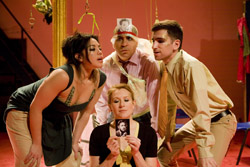These days at Georgetown, it’s all about Tennessee Williams. A flag proclaiming “A Season Named Desire” has been flying over the Davis Center since the beginning of last semester, mysterious signs for the “Glass Menagerie Project” have popped up all over Red Square, and the Department of Performing Arts is bracing itself for an influx of Williams scholars, actors, and enthusiasts this coming weekend.
All this hubbub seems a tad confusing at a school with few theater majors and no affiliation to the playwright. It’s this confusion that Performing Arts Artistic Director Derek Goldman hopes to eradicate with this weekend’s Tennessee Williams Centennial Festival, or Tenn Cent Fest—the climax of the Williams- focused “Season Named Desire,” and the first large-scale festival in the history of Georgetown’s Department of Performing Arts. And while the festival officially commemorates Williams’s 100th birthday, it is just as much a testament to the dedication and potential of Georgetown’s historically overlooked performing arts department.
“In the most exciting and exhilarating way, it’s stretched us incredibly thin,” Goldman said of the festival, which relied on the involvement of over 100 students as well as over 100 professional performers. “It’s taken the incredible commitment of staff and artists volunteering their time, and students pouring their blood and guts into it.”

One look at this weekend’s festival schedule makes that commitment obvious. In addition to performances of Williams’s more high-profile works like The Glass Menagerie, the festival includes a wide array of other performances either written by or related to the playwright. A staged reading of Camino Real, one of Williams’s more controversial and experimental works, will be performed by a cast of 27 students and professionals, including Theodore Bikel, who performed in Laurence Olivier’s original production of A Streetcar Named Desire, and Donn B. Murphy (COL ‘72), one of the founding fathers of Georgetown’s performing arts. Although not as famous as his other works, Williams wrote multiple versions of the controversial semi-autobiographical play, and a massive reading seemed a logical keystone for the festival.
“Camino Real is still such a radical work,” Goldman said. “I feel like it’s the play he’d want to hear on his birthday.”
Augmenting original Williams works like Camino Real are performances outside of the playwright’s canon. These include an “onstage conversation” with award-winning playwright and Williams admirer Edward Albee, and a special edition of the Friday Music Series entitled “A Concert Named Desire.” This adds an interdisciplinary aspect to the festival, making it more of a cohesive collection than a series of somewhat related pieces.
While the ties between the different pieces are readily apparent, the one thing left unclear is the connection between Tennessee Williams and Georgetown. According to Goldman, a lifelong fan and admirer of the playwright, Williams’ political and social undertones as well as his messages of tolerance embody the mission of the Davis Center and the University as a whole.
“A lot of the mission of Georgetown is that we come from a space of privilege,” he said. “Theater can be used to shine a light on aspects of our world that aren’t so easy to look at.”
With the festival attracting so much publicity for the Department of Performing Arts even before it officially kicks off, it raises the question of whether DPA will pursue similar undertakings in the future. When asked about upcoming festivals, Goldman heaved an exhausted laugh.
“I definitely feel like it will fuel other ideas for ambitious things, but next year we’re definitely not doing anything on this scale,” he said. “There’s a reason they only do the Olympics every four years.”





